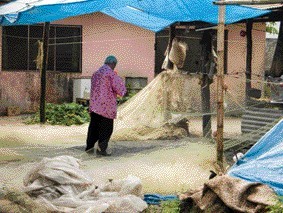
I have spent most of the last four months working in the South Pacific – in Fiji, Papua New Guinea (PNG) and a few other countries. Someone asked me if I would like to undertake a study on improving energy security in the region and after a few seconds hesitation I agreed. It has been a very enjoyable change from working in Scotland.
Most South Pacific islands are very dependent on imported oil products and the recent rises in oil prices are causing them enormous financial problems. The main focus of our study has been to identify ways of increasing domestic energy production, specifically renewables such as hydro, solar and geothermal, to replace imported and expensive diesel for electricity generation.
You may be surprised if I tell you that 85% of the populations of the countries I visited do not have access to electricity but that is true. Here electricity is regarded as a basic essential but in PNG and most elsewhere it is only available in the main town and cities. Most people rely on wood for their energy needs and to a much lesser extent on coconut residues and kerosene.
Papua New Guinea (PNG) is the only country in the South Pacific with oil and gas production. But oil output has fallen substantially in recent years and the country is now a net importer. However, PNG has very large gas reserves and ExxonMobil and partners are currently building a $15billion LNG plant. There are also plans for two other LNG plants although I doubt if all three will go ahead.
The other countries are virtually entirely dependent on wood/biomass and imported oil products for transport and electricity generation. There is a little solar energy but the prices of the solar panels are outwith the incomes of most people.
International bodies such as the World Bank, Asian Development Bank and European Union have funded various solar projects for schools and health centres but the experience with them has been mixed. The main problem has been an inability to maintain properly the facilities, particularly the batteries.
There is one major geothermal project in the region – providing power for a mine – and plans for others. There are both active and dormant volcanoes. However, the capital costs of new geothermal projects are such that these will only take place near urban centres and will unfortunately not benefit the rural populations.
I spent two weeks in the jungles of PNG staying in villages with no electricity and other mod cons. I was amazed at the number of people with mobile phones, however, and a top priority of many of the villagers was how to charge their batteries. There were surprisingly ambivalent opinions about the benefits of having electricity, which you and I obviously take for granted.
All the governments in the region have ambitious rural electrification policies. When I mentioned to one of the senior officials in PNG that many of the people in the jungle did not seem interested in having electricity he was very dismissive but I am still thinking seriously about what some villagers said to me about its unimportance.
As I mentioned earlier, 85% of the population do not have access to electricity. I doubt if that percentage will change much in the near future . . . maybe fall to 75% over the next decade. The electricity grids in the urban areas can be extended but for the people living in the mountains and on small islands there are few possibilities apart from solar energy and mini hydro projects.
There are a few windfarms but the wind potential in most of the South Pacific seems very small.
I went with high hopes for coconut oil, both to replace diesel for electricity generation and as a transport fuel, but I seem to have been too optimistic. The coconut farmers apparently can get higher prices for copra than the oil, and are also reluctant to agree to long-term supply contracts. That surprises me, given the price of imported diesel, so I shall do some more research on the issue over the next few weeks in the hope of producing a strong case in favour of coconut oil.
After that, I shall be back to West of Shetland developments and the Brent Decommissioning Programme. A change from the beaches of Fiji and Vanuatu.
Tony Mackay is the MD of energy economists Mackay Consultants
Recommended for you
